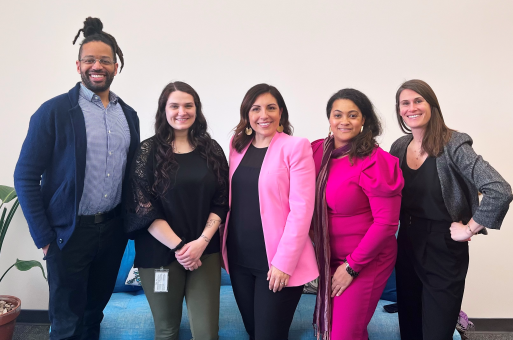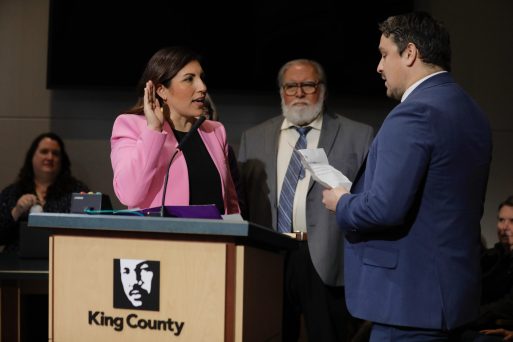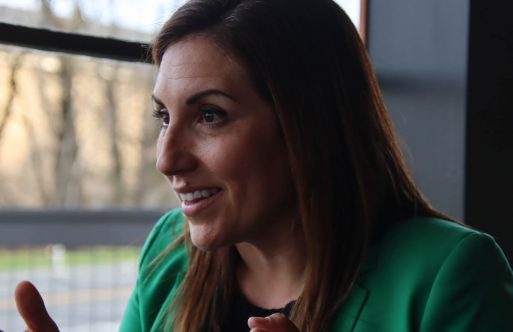(Also published on partner site West Seattle Blog)
Our area’s U.S. House Rep. Pramila Jayapal, a West Seattle resident when not in D.C., held a town hall meeting Wednesday night in her home neighborhood. She and her constituents brought up a wide range of issues, from the Israel/Hamas war to college costs to health care to UAPs (aka UFOs).
Rep. Jayapal said the community meeting at The Hall at Fauntleroy was one of more than 100 town halls she’s had since taking office seven years ago. “We may not agree … but whatever it is, I want to talk about it.” We recorded the town hall in two parts – first, her half-hour introductory remarks:
If you don’t have time to watch, here are our notes:
She said “funding for community-based projects” is part of the job – and that she has helped secure $50 million, with $17 million to come “as soon as we pass the government funding (legislation).” She mentioned food-bank funding and emergency housing as some of what that money goes toward. Other funding on which she’s worked included something showcased at a port event earlier in the day, %18 million toward truck electrification.
If you are associated with a nonprofit, she said, her office can help you look for federal grant money. And for individuals, they can help you navigate federal agencies. “Our job is to try to help you navigate what is sometimes just crazy bureaucracy,” or inaccessibility. They won’t necessarily be able to solve every problem for you but they can at least help you get an answer. This includes Social Security, Medicare, and immigration issues, she added. She hailed her staff’s tenacity in pursuing solutions for constituents. Specifically, she said, she’s hearing from constituents who have felt strong-armed into Medicare Advantage plans – or are having a tough time getting back onto traditional Medicare. She says she’s been pushing to get the federal government to crack down on Medicare Advantage-related fraud – she thinks those offerings shouldn’t even have Medicare in their name.
On other matters, she said this has been the least productive Congress ever – barely 20 bills passed by both houses and signed into law in 2023. Funding to keep the government running is usually finalized by year’s end, but isn’t yet – “this is the craziness we’re dealing with, we still have not funded the government.”
She accused the House’s Republican majority of holding the funding “hostage to their extreme ideas.” She says that includes solving the “broken” immigration system, but contends that the Republicans don’t want to do anything so the border mess will remain an election issue. She said immigration worked well decades ago when arrivals were allowed to work right away, and instead now they’re hung up in bureaucracy. Right now, Ukraine aid and border policies are all tangled up, she said. She also said they’re working to restore the child-tax credit to help lift families out of poverty, but that too is tied up with other matters.
She also mentioned the Foreign Intelligence Act, “protecting privacy,” with a bill passed out of the Judiciary Committee but still stuck on its way to get to the door. And the farm bill is awaiting reauthorization. She also said she will “not stop fighting” for abortion rights and gender-care rights, noting that she herself has had an abortion and is “proud mom of a trans daughter.” She moved from there to drug-cost issues, including capping insulin prices. Other issues she touched on: Some student-loan debt cancellation (see her website), infrastructure, tax-code changes, climate, antitrust enforcement. Also: “I know it isn’t enough and we have a lot more to do …” like ending the Senate’s filibuster rules. “You can’t just change the rulers, you’ve gotta change the rules.”
Then she got to the most intense current issue: “The terrible attack by Hamas on Israel, and Israel’s horrific war in Gaza, that’s happening right now.” She said she’s been calling for a ceasefire “to get to safety and peace for both Israelis and Palestinians. … Military action does not get us to where we need to go.” A ceasefire would mean more hostages could be released and “innocent civilians” won’t be killed, whether Palestinian or Israeli – “we have to see them as the same, they are the same.” She contended that Israel’s war on Hamas is only radicalizing more people. “We have to be thinking how we get to a durable peace in the Middle East,” where Israelis and Palestinians “live side by side.” She said she’s met with families “of dozens of hostages” … “I will continue to hold space for all the pain is out there … we have to get to peace … more military action only gets us more military action.” She was soundly applauded. In segueing to Q/A, she declared, “I’m fighting for freedom, for families, for faith” – not just religious faith, but “faith in our democracy,” the nation where she arrived at age 16.
From there, it was on to Q/A, which lasted almost an hour; the Israel/Hamas war was the most frequently mentioned issue, but far from the only one. Here’s the video, followed by our toplines:
First speaker in our video thanked Jayapal for her position on Gaza “and for also mentioning Ukraine,” for which the commenter advocated continuing aid, then asked, “How do we get more money (for Ukraine)?” Rep. Jayapal replied that it’s “tough” because “aid to Ukraine is something that Republicans say they’re not voting for.” She said she will have a tough time for voting for it if it’s “tied to bad border conditions” or a certain level of Israel military aid.
Second speaker wanted to talk about Alzheimer’s disease and thanked Jayapal for supporting a “national plan.” Jayapal promised to continue advocacy and support for resources.
Third speaker was 11-year-old Maya. “I was wondering why there was a lot of older people here,” which drew laughter. “My dad was saying it’s because younger people are not as interested in politics these days, and I was wondering what can be done about that.” Big applause. Rep. Jayapal said, “We need you!” – to talk to her friends and make sure they understand that decisions being made now will affect them for many years.
Fourth speaker said he’s been following news about UAPs (Unidentified Aerial Phenomena, formerly UFOs). He said he didn’t know if they’re real but if they’re not, a lot of government money is being wasted on them, so he wanted her support for those trying to find out the truth. She recapped the July 2023 hearing, legislation that’s been proposed, and she said she supports protections for whistleblowers, which could be important in getting to the truth.
Fifth speaker read from a statement that related to the “war on terror” and watch lists; Rep. Jayapal asked her to contact her staff so they could help her offline.
Sixth speaker voiced a concern about health care, as an entrepreneur having a difficult time finding an affordable health-care option. Rep. Jayapal said she’s been fighting for universal health care “because one of the places that gets most screwed in our current system is small businesses.” She acknowledged that the Affordable Care Act was “good for a lot of people” but not everyone – those who are paying overpriced premiums for high-deductible policies are subsidizing private companies’ profits. She said “I don’t have an answer for you” but “we’re working on it.”
Seventh speaker identified herself as an immigration attorney who works with children and asked where things stand and whether there’s “any hope of an asylum system.” Jayapal said the status of what’s been negotiated is “unclear” on some things; regarding asylum, there is money in a pending bill to hire more people to help, but it’s not clear right now that the bill is going to go anywhere.
Eighth speaker brought up the “upcoming election” and voiced various fears – from the current administration’s support for the Mideast fighting to the Republicans’ attacks on the trans community, of which they said they are a member – “my tax dollars are going to this genocide.” Jayapal said she’s doing what she can; that was countered with, “You’re doing the bare minimum.” She countered that she’s one of few voices in Congress for a ceasefire.
Ninth speaker said that President Biden is losing support with young people because of the action in Gaza and said he should stop sending weapons and “accomplish a peace agreement” if he wants to regain that support.
Tenth speaker asked what’s the best way to communicate with politicians, especially those who don’t share the same views. And she wanted to know what Rep. Jayapal thinks about the “criminalization of homelessness.” The reply was that she doesn’t believe that can be allowed to happen – “we need to build more housing, invest in more housing … long-term supportive housing …” Regarding the first question, she said research helps, as does “organizing people in (other members’) districts” to speak to an issue of disagreement.
Eleventh speaker said she works at Neighborhood House. She said more assistance is needed for low-income families – people line up hours in advance – and “the price of groceries is so, so high.” Specifically, she advocated for supplemental funding to help with food. Rep. Jayapal said that was “never (before) a partisan thing” – yet now it is – “there are so many hungry people in our country.
Twelfth speaker was concerned about politicians who seem to have jobs for life. Rep. Jayapal said she agrees that term limits are important – like limits on how long you can hold positions leading committees.
Thirteenth speaker asked about the congresswoman’s “commitment to student-debt relief.” She said she’s fought for it before and is fighting for more, as well as backing a “College for All” bill that she says would make college tuition-free for everyone.
Fourteenth speaker asked about universal health care and wondered why the US has to “reinvent the wheel” instead of having a system like the EU. Rep. Jayapal said “it’s very hard to dismantle” the current system of private companies and private insurers when they have so many lobbyists. “Every time we try to move in this direction we get this massive pushback … I share your frustration.” She said that while it’s seen as a “far left” position here, it would be seen as “centrist” elsewhere in the world; the only way to change that, she said, is to “build a big movement” to force change.
Fifteenth speaker asked about walking and biking safety. “Local action can’t fix a nationwide issue,” she said, noting the preponderance of large SUVs, for example. Rep. Jayapal said some federal “Safe Streets” money was indeed allotted to Seattle, and said she’s cosponsoring a national commitment to zero fatalities by 2050. She said she also has signed a letter to the USDOT supporting walking/biking safety as criteria for grants.
Sixteenth speaker said he has voted Democrat for 40 years but is going to have a hard time voting for President Biden because of the current Mideast fighting. He asked Jayapal to convince him why he should. She said she can’t “make a moral argument about what America is doing in Gaza” and that she doesn’t agree with everything the president does but “we are in a space right now where the threats against our democracy are so real … if you think what’s happening now in Gaza is horrific, imagine what’s going to happen when Donald Trump gets into the White House. … Don’t step away from democracy.”
Seventeenth speaker said “our government’s a little too male, pale, and stale.” She then asked how much money and weapons the U.S. has provided to Israel, and said she’s disgusted about what’s happening in Gaza. She also complained about a particular political action committee that Jayapal described as “dark money.”
Eighteenth speaker (first joking that he’s a “pale male” but “not stale.”) said that with crime in Seattle, a lot of people are “buying weapons, and I’m concerned about that.” Then he segued into concern about college costs
Nineteenth speaker wanted to know how Rep. Jayapal would “fight for a free Palestine even after a ceasefire.”
Twentieth speaker, identifying himself as a naturalized American, wanted to know what she’s doing about “moving country-of-origin quotas.”
Twenty-first and final speaker had a letter to submit for her signature – she asked that it be provided to her staff.
Rep. Jayapal then delivered some quick answers to the final questions. For public safety, she said services are needed as well as gun-law reform. Regarding college costs, state and federal aid used to cover 70 percent of the cost – now they cover 30 percent, as the federal government has disinvested in education, so correcting that is important. Regarding Palestine, she said she agrees it’s troubling that there’s no discussion of the lasting peace, of a two-state solution, everything is focused on the military situation right now. Regarding the immigration question, she said things are rather convoluted right now – per-country caps are disproportionate – “these are really big issues” that are part of the immigration-reform proposal.
And after an hour and a half, she wrapped up, offering words of thanks (and photo ops).
CONTACTING REP. JAYAPAL: Contact info for her Seattle and D.C. offices is here; getting help with a federal agency, as she discussed, is addressed here.





 The biggest race in our area is for the County Council District 8 seat that Joe McDermott is leaving after 13 years. In tonight’s first and only round of
The biggest race in our area is for the County Council District 8 seat that Joe McDermott is leaving after 13 years. In tonight’s first and only round of 
 The
The 
 watched tonight as her successor was elected.
watched tonight as her successor was elected.
 The fields are set for the August primary. The marquee local race in our area this time around will be for 34th District State House Position 1, from which Rep. Eileen Cody is
The fields are set for the August primary. The marquee local race in our area this time around will be for 34th District State House Position 1, from which Rep. Eileen Cody is 
 As the
As the